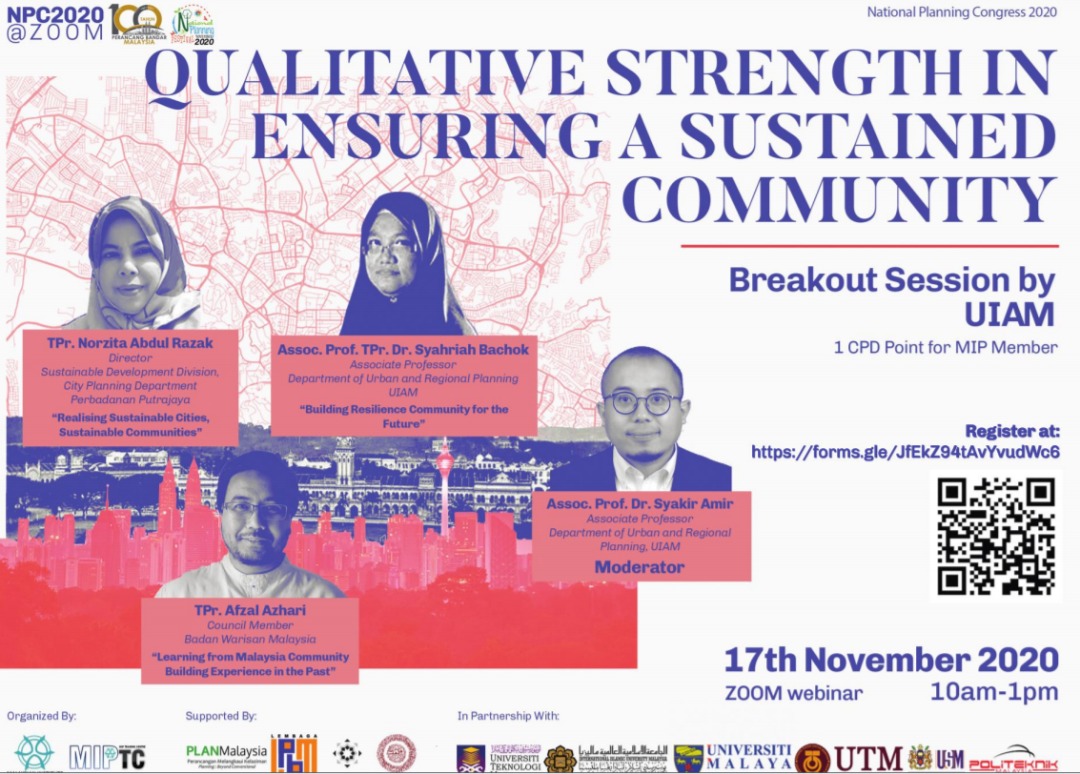By Aina Mardhia Ismail
GOMBAK, 17 November 2020: The Department of Urban and Regional Planning (URP), Kulliyyah of Architecture and Environmental Design (KAED), led a breakout session for the National Planning Congress (NPC) 2020 on the theme “Qualitative strength in ensuring a sustainable community living in Malaysia”.
The breakout session consists of three distinct panellists presenting sustainability and resilience community living from their perspective and experience working as town planners in the country. The session was moderated by Assistant Prof. Dr. Syakir Amir Ab Rahman from URP.

The Director of Putrajaya Corporation, TPr. Norzita Abdul Razak kickstarted the breakout session by pointing out that Malaysia has always been committed in promoting sustainable community living.
Norzita mentioned that the government asserts efforts in cooperating and translating the Sustainable Development Goals (SDGs) and New Urban Agenda (NUA), published by the United Nations in Malaysias very own physical development planning framework
She shared that The National Physical Plan 3 (NPP3) published at federal level is an example of the government’s strategy in executing sustainable living.
The NPP3 aims to build a resilient nation to ensure continuous and sustainable growth after 2020 which falls into the state and local authorities to coordinate relevant actions in making the goal a reality.
Norzita emphasised that efforts on implementing sustainable living relies in every city as no cities are similar to another. œEvery city has its own uniqueness and constraints that we cant really translate strategies from other countries to fit in Malaysias own sustainability plan, Norzita added.
In relation to that, Norzita shared that Putrajaya Structure Plan 2025 published by Putrajaya Corporation deployed the theme on Sustainable Putrajaya as one of the approaches to adopt sustainable and resilience community living in the Federal administrative capital.

TPr. Afzal Zahari
The second breakout session by Honorary Council Member, Bandar Warisan Malaysia TPr. Afzal Zahari shares his view on sustainability through the lens of heritage. He highlighted that heritage is just another word to sustainability.
He stressed that œheritage is sustainable as heritage is anything given to the future generation to sustain and preserve. He pointed out that the preservation of cultural and historic heritage is crucial as it is part of community’s identity.
Afzal brought up the idea that “knowing in what” and “what not to preserve” is an act of maintaining balance in the community.
He discussed that not everything in the past needs for conservation, some turn out irrelevant to be kept down the line.
Agreeing with Norzita’s view, Afzal clarified that every city has a different background, spatial, behaviour in cities that only its people could connect to their place’s heritage value.
“A community born and live in an area grows a sense of pride in their own culture and heritage which led them to protect themselves for the future generation,” said Afzal.

The third breakout session by Associate Professor Department of URP, KAED, TPr. Dr. Syahriah Bachok focused her discussion on building resilience community for the future.
Syahriah figured that community should have access to food, settlements, job and income, infrastructure, and proper sanitation system to achieve a sustainable living.
She responded to one of the questions on resilience, robustness in community participation in solving everyday issues and problems. She suggested that initiating a platform for public participation session can bring changes in the area.
Engaged in mitigation of natural disaster herself, Syahriah encourages the audience to consider nature-based solutions for climate mitigation and adaptation. Some solutions mentioned were green space management, organic farming, managed re-wilding, land restoration and sediment trapping.
In the light of COVID19, Syahriah shared that distance is one of the predominant measures to build community resilience and sustainability against disaster. Restricting household travels outside their home is one of the measures applied by the authorities to ensure communities can sustain from the downturn effect of the pandemic.
The three-hour webinar led by Department of URP, KAED, was one of the few breakout sessions organised by the Malaysian Institute of Planners (MIP) and Board of Town Planners Malaysia (BPTM) in conjunction with National Planning Congress 2020 with the theme of “Reimagining The City For A Virtuous Civilisation”.
Online registration can be done through the link: https://forms.gle/JfEkZ94tAvYvudWc6 . Check out the Malaysian Institute of Planners Training Centre (MIPTC) official Instagram account https://www.instagram.com/miptc.planning/?hl=en for more event updates in the future. ***
